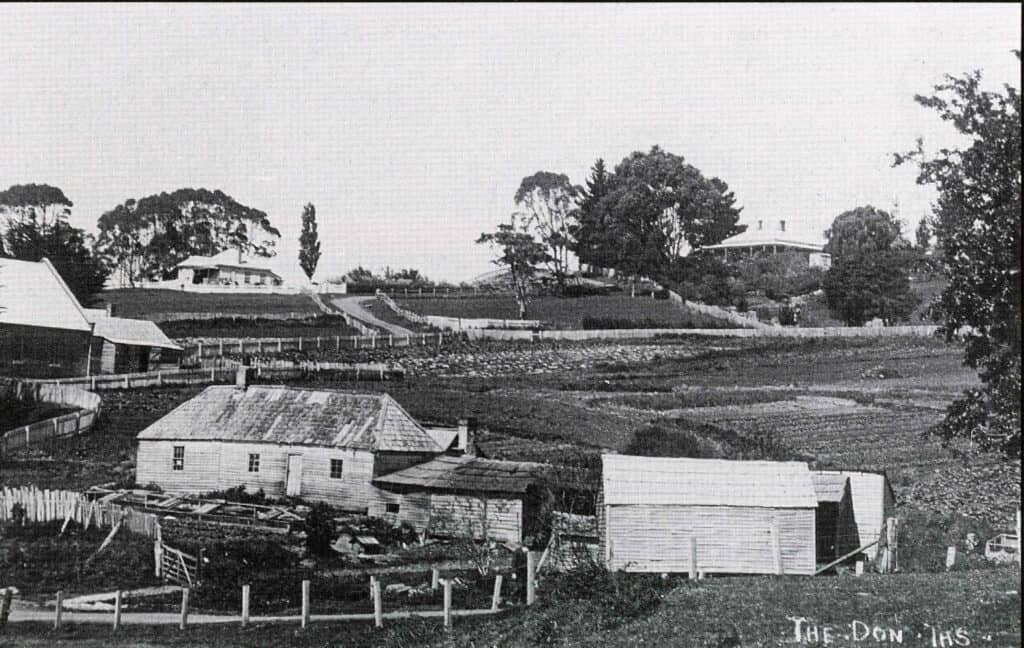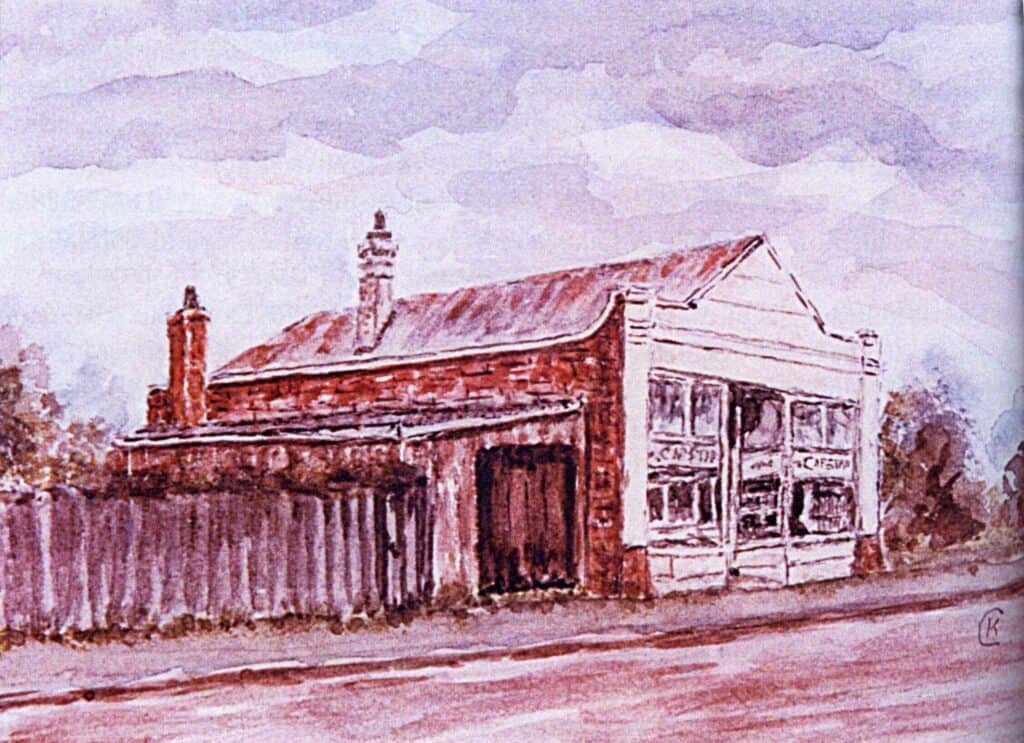In the early 1900s there were a number of market gardens in Devonport, most of them worked by Chinese migrants. At least eighteen Chinese people – referred to by newspapers of the time as ‘The Celestials’ – were known to have had market gardens in both East and West Devonport. As the term Celestials was used more often than specific names, it can sometimes be difficult to identify individuals.
Apart from their market gardens, the Chinese also had a sideline in Chinese medicines. Local people would bring them freshly killed blackbirds in exchange for vegetables and, after the blackbirds were dried and other ingredients added, medicines were made which were said to cure many illnesses. Apparently although initially reluctant to take these concoctions, the locals came to see first-hand their efficacy and began to accept and use them.
On occasion the Chinese market gardeners were visited by Chinese missionaries. Newspaper reports suggest both locals and Chinese attended services in a borrowed church on these occasions. Although the locals couldn’t understand the service, hymns were sung in both English and Chinese and it seems a worshipful time was enjoyed by all. A report in the North West Post of 1902 speaks of the church being full, with a large number of locals besides fourteen Chinese. The proceedings, it assures the reader, were at all times carried out in a reverent and orderly manner.
Some of the Chinese did become well-known enough in the community to be mentioned by name in newspaper articles, and their gardens can also be traced in public records. In 1905, Charlie Ah Tit was reported to have market gardens at the Don, renting fifteen acres behind the Don Company Store, and in 1911 other members of the Chinese community joined him, trading as Ack Lee and Company. Their gardens took over most of the vacant land behind the store, which was irrigated by a creek. The Lodder family, from whom the land was rented, had an electricity plant with a dam and water wheel at the top of the land. As well as directing water to the Lodder’s dynamo, water was distributed to the gardens. The result was a reliably productive site.
It seems that Mr Charlie Ah Tit was one of the most prominent Chinese people in Devonport. Not only did he have market gardens, he also had a shop on the Formby Esplanade. The shop sold produce from the gardens and was also a general store, and Ah Tit is thought to have rented the premises as early as 1895. His holdings not only included the shop on Formby Esplanade and market gardens at Don, but extended to market gardens in Steele Street on the site that would eventually become the Devonport Maternity Hospital. Records also show he had market gardens in East Devonport and on Appledore Estate. Appledore Estate was near a creek used by Bartholomew Thomas for water for his brewery, and records indicate that from 1901 to 1923 the executors of the Thomas estate also rented thirteen allotments to Mr Soo Kee. With Charlie Ah Tit’s gardens also there, records indicate a total of twenty-two blocks of land on Douglas and Chamberlain Streets were being utilized as market gardens by the Chinese.

It is not certain when the market gardens ceased operating and the Chinese left Devonport, but it appears they did so. In her book Discovering Devonport Tasmania, Faye Gardam says the Don market gardens ceased to be worked in 1921. Newspaper reports from that time say that the Chinese who worked the market gardens in Appledore had sold their business to Shoon Woo and Co. Shoon Woo had previously been known to have market gardens at the Don. The previous market gardeners at Appledore, Ack Lee Company and some twenty Chinese workers, were said to be moving to other areas, although reports did not specify where. It was reported, however, that it was believed some of them were returning to their homeland.
One wonders if part of the desire to return home may be found in newspaper reports of the time which suggest a disturbing amount of aggression levelled at the Chinese. Some incidents were fairly minor – reports of locals stealing vegetables from the gardens and throwing stones at the Chinese when being caught out, for example – although thefts reached such a level that the market gardeners started to put men on watch. Court records seem to indicate that alleged perpetrators of these incidents may have been let off by the courts when they denied any knowledge of the crimes. In one incident where a local was found guilty and fined, the Chinese market gardener who had brought the charge was also fined for using water during prohibited hours. More disturbing, however, is an incident reported in the North West Post of 1902. It seems that two men asked for cigarettes in Charles Ah Tit’s shop, but left without paying. Mr Ah Tit and an assistant gave chase, but the two locals were joined by six others who proceeded to violently assault the two Chinese. They managed to escape, but one of Ah Tit’s eyes was badly damaged and his companion was even more badly beaten, with it being claimed his face was unrecognizable. At the time of the newspaper report the perpetrators had not been identified and no arrests had been made.

Perhaps over time relationships improved, however. It has been noted that locals eventually accepted Chinese medicines, and it appears at least some of the Chinese were integrated into the local community in what seems a rather unusual way. A newspaper article from 1906 mentions five Celestials taking part in what appears to be a wood chopping competition, with it being reported that Charlie Ah Tit, while not a winner, chopped well.
It seems that relationships between the Chines themselves were not always frictionless, with newspaper reports of 1892 highlighting accusations of attempted murder, although it seems these came to nothing. The Examiner of 1918 reported that some of the Chinese were on strike. There appears to have been a dispute over the settlement of accounts, because some of the men involved in market gardening felt that not all members of the partnership were doing their fair share of the work.
Charlie Ah Tit’s shop on Formby Esplanade, thought to be one of the oldest shops in Devonport, was demolished in 1974. During demolition a ledger and account book kept by Mr Ah Tit were found. The books, dated to 1889 and 1902, were shown to Chinese language experts who discovered that Ah Tit’s shop was called ‘Tung Fook,’ which means ‘Happiness Together.’ Apparently the books were meticulously kept records of the shop’s sales and expenditure. They reveal he had many Chinese customers, and that Holymans were also regulars. The records show Ah Tit selling horse feeding troughs, candles, soap, rice, sardines, chocolate, cigarettes, tea leaves, wheat and eggs. Produce from the market gardens would also have been sold through the shop, indicating that for the time he was in Devonport Mr Ah Tit had a prosperous business.
References:
- The Advocate, Friday 6th May 1921, page 2
- The Advocate, Saturday 26th March 1927, page 4
- The Advocate, Wednesday 22nd May 1974
- The Examiner, Thursday 9th April 1914, page 5
- The Examiner, Monday 29th April 1918, page 3
- The North Western Advocate and the Emu Bay Times, Tuesday 25th November 1902, page 2
- North Western Advocate and the Emu Bay Times, Monday 15th January 1906, page 3
- North Western Advocate and the Emu Bay Times, Wednesday 15th May 1907, page 2
- North West Post, Thursday 28th January 1892, page 3
- North West Post, Thursday 6th December 1900, page 2
- North West Post, Saturday 18th March 1902, page 2
- Discovering Devonport Tasmania, Faye Gardam 2017, pages 227 and 228
- Sawdust, Sails and Sweat, Faye Gardam 1996, page 258

